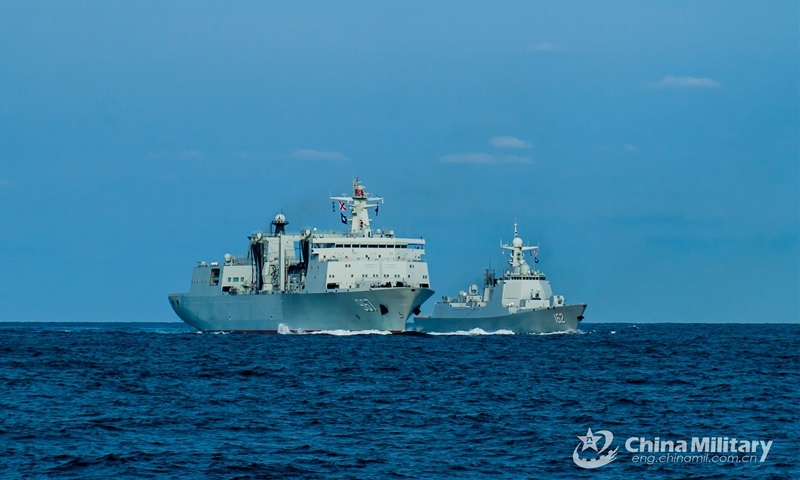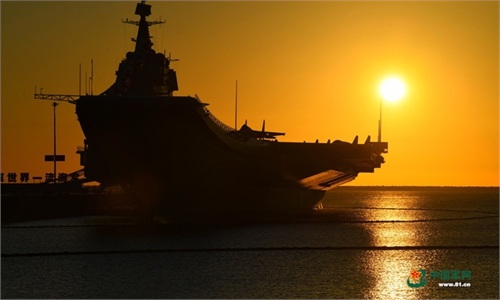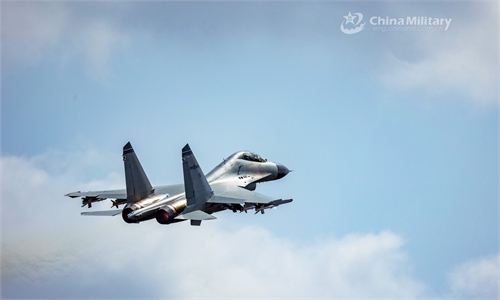
The comprehensive supply ship Chaganhu (Hull 967) executes underway replenishment-at-sea alongside with the guided-missile destroyer Nanning (Hull 162) during a four-day-long realistic-combat training exercise in waters of the South China Sea recently. They are attached to a destroyer flotilla with the navy under the PLA Southern Theater Command. (Photo: eng.chinamil.com.cn)
Chinese experts slammed recent reports by a US think tank and media outlets on Wednesday, criticizing them for once again hyping China’s overseas military bases. They argued that these speculations are self-contradictory and untenable.
A recent report by the Council on Foreign Relations, a US-based think tank, claimed that China’s investments in strategic overseas ports have potential dual-use, specifically for commercial and military purposes.
According to the report, there are 92 port projects outside China with Chinese investment, 13 with majority Chinese ownership, and 10 with the physical potential for naval use.
The report, published on Monday, further asserted that China’s heavy investment in the world’s most-connected ports highlights its strong influence over the supply chains of global trade. It argued that China’s leverage over the West does not necessarily lie in building newer and bigger naval bases but in its varied degrees of investment and ownership in the world’s busiest and most-connected ports, which underpin the global flow of goods.
Zhang Junshe, a Chinese military expert, told the Global Times on Wednesday that such hyping tactics have long been used by US politicians and media to tarnish Chinese companies’ normal commercial activities and other forms of cooperation, creating a “China threat.”
Zhang stated that China’s overseas port projects are win-win cooperation with destination countries, as they boost local economic development. He also mentioned that the US benefits from such cooperation with Chinese companies. For example, at the Port of Boston, COSCO Shipping from China has created over 400,000 jobs for the local population. Zhang added, “The think tank report also suggested that the Port of Los Angeles has the potential to host Chinese naval ships, but the US will definitely not open it to the Chinese navy. So the report contradicts itself and is untenable.”
On Tuesday, a Bloomberg report added Oman to the list of countries where China could potentially build overseas military bases, citing unnamed sources who said that Chinese military officials discussed the matter with Omani counterparts last month, and the Omanis were said to be amenable to such a deal.
This list also includes countries like the United Arab Emirates, Thailand, Indonesia, and Pakistan.
According to Bloomberg, opening a base in Oman would complement China’s logistics support base in Djibouti.
Zhang criticized US media for once again groundlessly hyping the “China threat” theory with only speculations.
He emphasized that the truth is that China has only one logistics support base, which is in Djibouti, while the US maintains 800 overseas military bases worldwide. Zhang noted that if the US redirected the expenditures of these bases to help developing countries build civilian facilities like ports to boost interconnectivity, it could have made more contributions to mankind.
However, Zhang pointed out that US media fails to remind the US to assist developing countries but chooses to accuse China, primarily because it does not want to see China grow in influence.
Another Chinese military expert, who requested anonymity, told the Global Times on Wednesday that as China has more overseas interests, including projects, investments, and nationals, as well as growing international responsibilities to provide international public security goods like anti-terrorism and anti-piracy escorts, as well as humanitarian aid and disaster relief, it is perfectly justifiable for China to develop its far sea military capabilities.
Unlike the US’ overseas military bases that are built to maintain the US’ military hegemony around the world, China’s overseas military presence aims to contribute to peace and stability, the expert said.




